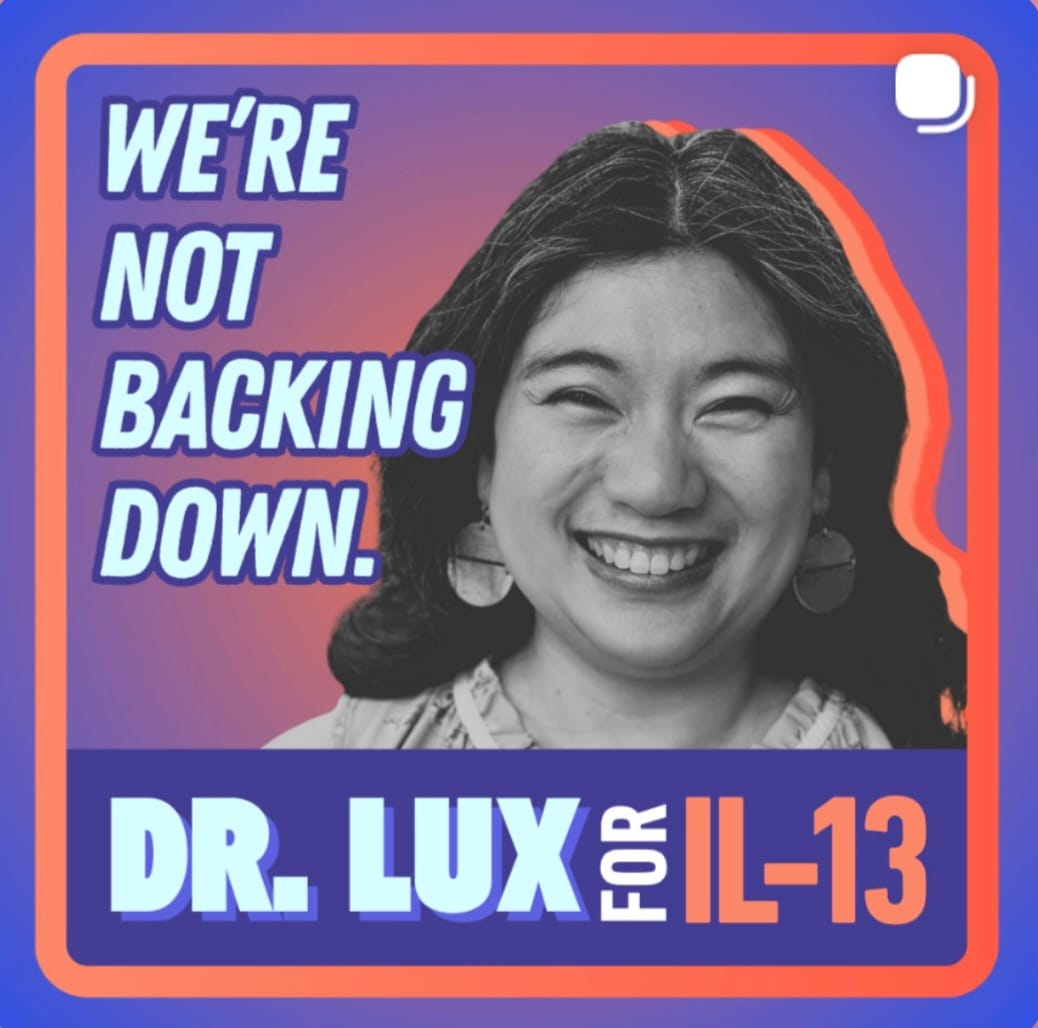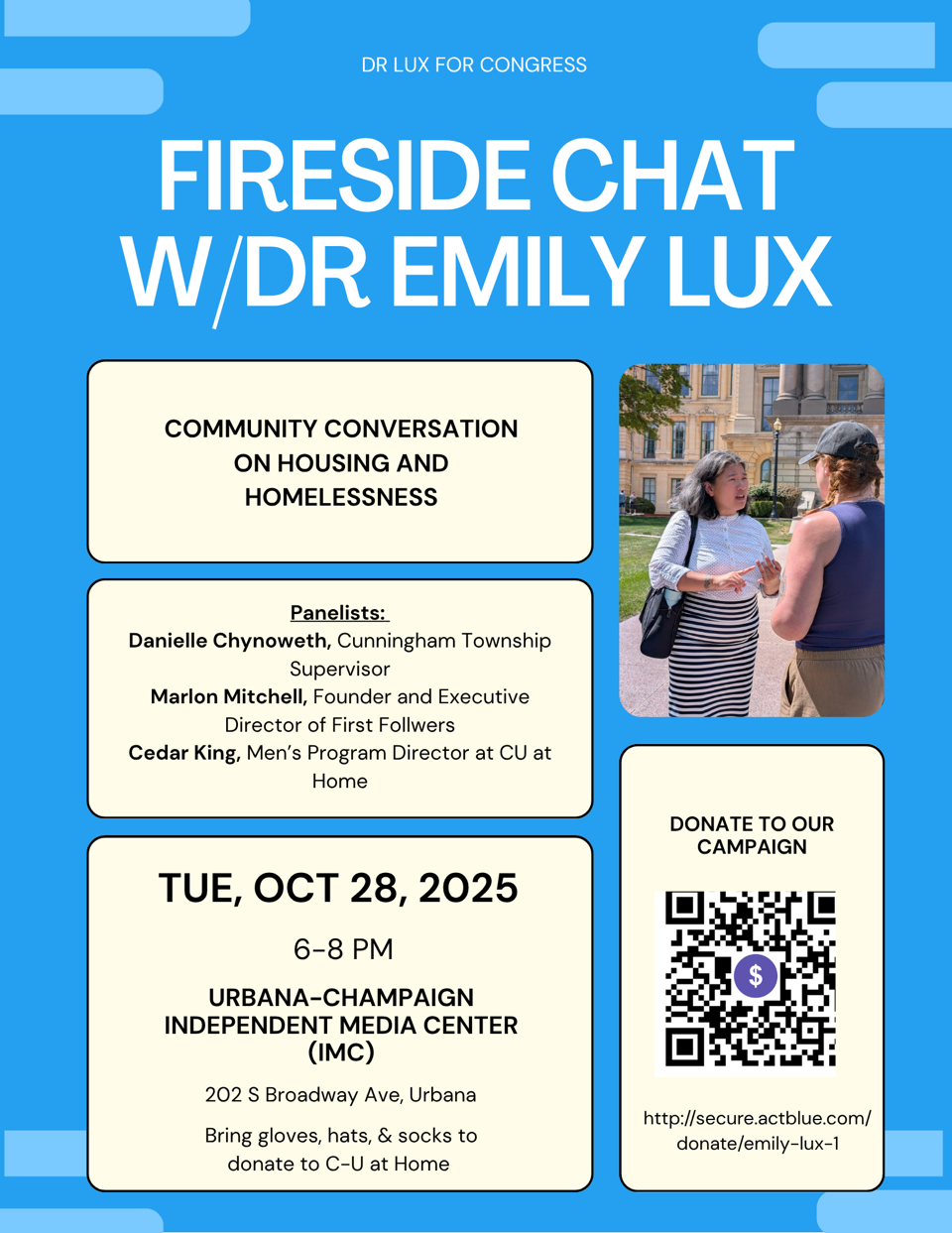Meet the (Potential) Candidates: Dr. Emily Lux
Join us as we interview the first of two challengers to District 13 Rep. Nikki Budinzinski in her next Democratic Primary.

As we march toward another election season, two challengers have emerged to face off against District 13 Representative Nikki Budzinski in the Democratic primary. Earlier this month, I (Editor-in-Chief Jada Fulcher) interviewed both prospective candidates who seek to be on the ballot with Budzinski. Both challengers will need to provide just under a thousand signatures to be put on the ballot, with petitions being due on Monday, October 27th.
First we will highlight Dr. Emily Lux. Enjoy!
Edited for length and clarity
Fulcher: Give me your name, age, pronouns, and an idea of your professional work. Dr. Lux: My name is Emily Lux, I am 45 years old, my pronouns are she and her, and I have 21 years of social work experience. I've worked with older age adults, I've worked with developmentally delayed adults, I've worked in alternative schools, I've worked with substance users, women in prison, gosh so many. I've worked in the ER at Carle, I've worked as a private practicioner for parents, mostly birthing people with post-partum depression and anxiety. My goodness, what else have I done? Anyways, that's a smattering of what I've done over the last 21 years.
Are you a part of the LGBTQ+ community?
I'm not a part of the LGBTQ+ community, but I am very supportive of it and it's actually a big reason why I decided to go into politics this year.
Who is Dr. Emily Lux?
She's probably like your next door neighbor, your friend. I am in politics because I want to change things. I'm not so much into the publicity of politics, I just want to have the power to change things. I've worked lots of marginalized groups, and I want to bring their voices to Congress with me. I want them to be able to see themselves in politics, and I want them to be able to vote for an option that is 100% in their benefit.
Talk to me about your history living and working in Champaign-Urbana.
I moved here from Columbia, MO to go to undergraduate school in 1998, and I've stayed here ever since. As part of this community, I actually experienced post-partum depression after my first child. So that was the first time in this community for me using extensive resources myself. I used the crisis nursery, I used group therapy, I talked with Carle Hospital, so I have an idea of what it's like to be a person in district 13 using resources in district 13.
Tell me a little about what led you to studying social work. I actually had contact with the child welfare system twice during my childhood, and I saw the good and the bad about the child welfare system, and when people think of social work they automatically think child welfare system, so I was kind of drawn to it. I had a wonderful case worker, she was a social worker. She made a difference in my life, and I was hoping to do the same with some other child.
When did you decide to run for office? I've always had it in the back of my mind, I actually started the year thinking that I would never run this year, but as soon as Trump was inaugurated he started with the executive orders and I started to see the results of those executive orders quickly transforming our society and our local community. I really saw the attitude toward the LGBTQIA+ community change with even more hate and vitriol that was really scary. To be honest, there was so much hate and vitriol that there were days that I was scared to stand up and run for politics, and my overall decision was "I have more privilege than a lot of these other victimized people do. I'm gonna do it, I'm gonna put myself in the line of fire. I'm gonna run for Congress and I'm gonna fight for equality."
When did you actually start forming this campaign?
I only remember this because it was the day after Valentine's Day. I remember telling my parents on the phone that I was gonna run the day after Valentine's day, and that was kind of official enough for me. I had to get my ducks in a row, I'm a professor so that was a really demanding job, but I finally announced in early June.
Talk to me about your decision to run for this seat. Why Congress? Why Nikki Budzinski's seat?
I see that we have some differing approaches to politics. Some of the ways she's voted has really concerned me, and I don't think they fully embody the democratic values. I know that she has said things that are not supportive of the LGBTQ community, and that was a big reason for me to run. I also don't take corporate or AIPAC money, I wanted to just do things differently that she did. I felt that the democratic party needed someone to run that was truly 100% democratic down the line.
Are there any specific decisions of Budzinski's or policy choices that she made that you would have done differently? I know that I would – and I'm sure she's lovely. This is the part of politics that I hate, criticizing them, but I know I would've done things differently. I wouldn't have thanked ICE, I wouldn't have voted for [The Laken Riley Act], I would go to town halls and say the word transgender, I would not take AIPAC money, I would not vote to give money for weapons for Israel, she's made some environment votes that are different. She is for carbon capturing and sequestration, I don't think it's very safe for our constituents, especially with the Mahomet Aquifer. She just recently wanted to memorialize Charlie Kirk. I realize she makes these decisions based on what she thinks District 13 wants, but I truly want to be representative of a part of District 13 that isn't getting their voice heard.
How does it feel running against an incumbent in the same party?
I've gotten a lot of criticism for that, but I live in this district, I love this district, I have an equal shot to represent this district well. If I believe that the incumbent were providing voting options that I agreed with, I would not run for this seat. For example, I did not want to run for [State Representative] Carol Ammons seat. That, to me, would be really going against someone who is doing a wonderful job. It's not easy running against an incumbent, especially a Democratic incumbent, but I feel like I have just as much of experience in the district to represent another side of District 13.
What are your top issues, should you get into office? The economy, homelessness, and human rights are my three biggest ones. I've done some work around District 13 interviewing different agencies. And when I say human rights I mean healthcare rights, I interviewed with GCAP (Greater Community Aids Project) and they talked to me about stigma in healthcare and how people are denied healthcare because of their status. I've talked to the UP center and talked about how the LGBT+ community is significantly more likely be unhoused than any other community, and that's because they''re more likely to be kicked out of their houses, more likely to experience discrimination in employment, they're more likely to not be able to fit concretely into a men's housing shelter or a woman's housing shelter, and even when they are they're harassed. That's what I mean when I'm talking about human rights. Healthcare is another issue, I met with Elevated Access last week. We talked about how what they do is they are a non-profit that flies patients and providers to get abortions and gender affirming care in other states where they can access it, for free. I see the need for healthcare that's affordable and accessible for everybody. The economy, I'm meeting with some college students on Monday, I believe in college loan forgiveness. I have two kids myself, I believe there should be some help with the daycare, it's as expensive as my mortgage. I talked to a constituent when I was canvassing and he said he has never worked a job that he loves, all his work decisions are based on health insurance because his wife has a chronic illness. Because the US ties healthcare to employment, it really limits our ability to do what we thrive at and do what we really want to do. I met with Julie Pryde from CUPHD and we talked about how there is a housing crisis in district 13. It's not that there's not enough housing, it's that there's too much housing that's for wealthy college students, there's too many Airbnb's, and there's not enough low to middle income housing options. I've also met with Champaign Housing [Authority] and I know that they are trying to fix the housing situation, but it's hard. It's very systemic and you have to go from the top to the bottom and the bottom to the top. I've talked with First Followers and I understand that homelessness happens after incarceration because there's not a lot of support for reentry. It affects almost every population that I deal with.
That makes sense, I'm sure your background as a social worker informs your knowledge of the unhoused population. In social work, I learned about Maslow's Hierarchy and that means that your physiological needs need to be met and your safety needs need to be met before you can meet any other needs and thrive. And housing, shelter, food, those are all things that are in the first tier of things that need to be met. If we want a district 13 that's thriving and productive, we need to meet those needs.
Talk to me about what more you would like to do in this position to support our local queer community.
There's been some recent decisions made by the supreme court, one of them was US v. Skrmetti, the other one was Mahmoud v. Taylor. Those scare me, and as a member of Congress I would like to be able to, as a part of the three checks and balances, be able to prevent those from going through, and do everything I can to protect the rights we have now, and prevent any more rights being taken away, because it is happening at a very rapid pace.
What change do you hope to bring with you in this position? What would you like the everyday person to see change?
I want the everyday person to know that there is a place for them in politics. There is a reason to vote, there's a reason to advocate, it's not all hopeless. I'm always saying to myself "wouldn't it be amazing if the population of the voice that was trying to be silenced, we all band together and have the biggest voice of all and won this election?" I just want them to know they are valued, and there are people that agree with them and want to support them.
You are not the only person looking to primary Nikki Budzinski, Dylan Blaha is also gathering petition signatures for that as well. You both have criticized Budzinski for her past policies choices, but, of the two of you, why do you think you're the better pick?
I am a member of marginalized communities, I am an Asian-American female, I have two children, I went through the child welfare system, I have experienced being homeless. I've worked in social work for 21 years. I also have research and policy training, specific research and policy training in social work. So I know how to read data and make policy or to read data and criticize policy, and that's why I think I'm a better pick. Although he's lovely.
Talk to me about what the process of collecting petition signatures has been.
To be perfectly honest, it makes me anxious. I'm very vulnerable, I'm setting myself up for a lot of opinions and feedback. But in spite of the anxiety, which I do suffer from anxiety, I have met so many wonderful people and I have heard so many stories that I can bring to the table. I can bring to the table at a debate or I can bring with me to Congress someday, or I could just bring with me and elevate their voice and I can share it with other people. The anxiety is tough but the experience is wonderful. I've gone to festivals, I've gone out of town to get signatures, I've gone door-to-door, I've met with the Illini Democrats. It's just been wonderful to connect with people and that's why I'm in this profession, because I care about people. So that's been really wonderful to capture their stories.
Any closing thoughts?
I just wanna say that, there are a lot of people I love who are in the LGBTQIA+ community, and I've heard lots of stories just through petitioning, and I am 100% genuine in my hopes to bring equality to this community. I've seen a lot of hate and suffering and I won't stand for it, and I just want that sincerity to come across.
According to a statement from Dr. Emily Lux, her campaign has met the minimum signature requirement for being placed on the ballot for this election, though she is still seeking signatures to add. Petition signatures can be challenged in court to knock opponents off the ballot, so if you would like to add your signature to her petition, you can reach out through the contact info on her website linked here, or through her Instagram and Facebook. Dr. Lux's next in-person event will be a Community Conversation on Housing and Homelessness at the Independent Media Center (202 S Broadway Ave, Urbana) on October 28th. More info on the flyer below.
Look out tomorrow for our interview with prospective candidate Dylan Blaha!

